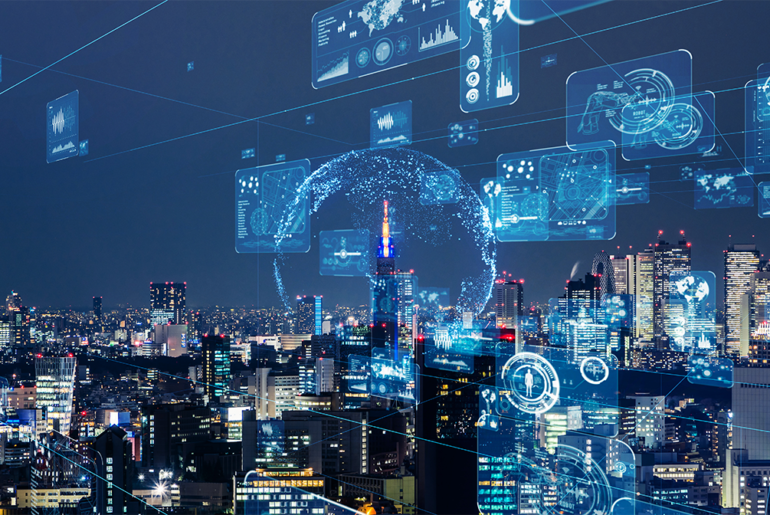Unprecedented Urban Growth Needs Exponential Innovation
Globally, as of 2020, 55% of people live in cities according to the World Bank and by 2050 that number is estimated to reach 70% of the worldwide population, totaling nearly 7 billion urban inhabitants. With this unprecedented growth, the challenges of making these environments safe, healthy, productive, and thriving have never been more difficult.
Governments worldwide are also under pressure to reduce costs while at the same time improving and modernizing services. These dual pressures are pushing cities to be smarter and look to innovative tech solutions to help drive outcomes. It is in this context that we see the rise of Artificial Intelligence (AI) and Digital Twins as they are applied more frequently to address the most pressing concerns for city officials and constituents.
What is Artificial Intelligence?
Artificial Intelligence (AI) Applications are defined as enterprise applications powered by intelligent technologies such as machine learning including deep learning for natural language processing, voice/speech recognition, image/video analysis and time series analysis that drive insights, provide predictions, support conversations, recommendations and/or automate tasks and processes. Some areas where AI is being applied in smart cities are the following:
Top 10 Artificial Intelligence Uses Cases having the Greatest Impact on Mission Outcomes in Government
- Public health promotion, disease prevention and management (including contact tracing)
- Shared digital workspace, productivity and collaboration tools
- Employee self-service tools
- IT infrastructure security monitoring
- Loans and grants management
- Environmental monitoring (air quality, water quality, weather monitoring)
- Digital content, document and workflow management
- 311 and constituent self-service
- Facilities and building management
- Public safety, security, surveillance
What is a Digital Twin?
Digital twins are the extended application of simulation and visualization throughout a digitally transformed organization, for better communication and collaboration using complex, rich data. IDC predicts that by 2023, 25% of successful Smart Cities digital twin platforms will be used to automate processes for increasingly complex, interconnected ecosystems of assets and products.
The digital twin is a solution-based approach capable of producing high-fidelity copies of a city or other geographic space. This digital copy is based on a wealth of potential data sources such as GIS base layers, IoT sensor data, historical data sets, and other “Smart City” sources such as crime data and multichannel nonemergency citizen reporting systems like “311” systems, environmental monitoring, planning and permitting, and transportation infrastructure. Bringing together this breadth of information in a three-dimensional (3D), high-fidelity, single source of information enables organizations to conduct better analysis and more accurate scenario planning.
Walking Before You Run
So you want to get started in using these technologies, well, some fundamentals are in order first. Both AI and Digital Twins rely on high quality data to function well and provide real value to the organization. Taking a hard look at your data ecosystem and building some important foundations can pay off later when more advanced solutions are implemented. Without these questions answered it is a sure path to failed projects and cost overruns.
- How secure is your data?
- In a regulated environment, what can you legally use the data for?
- What does your Master Data Management ecosystem look like?
- Do you have good metadata and data dictionaries available for developers and end users?
- Do you have a secure and standardized way to move data between systems?
- Where do you keep your source code and are you using version control?
- What is your appetite for risk, and do you have a mitigation strategy in place should things go wrong?
Where to Next?
Artificial Intelligence and Digital Twins are only just beginning to become a critical component of how cities operate. This will continue to accelerate as the tools not only become more mature but also become incorporated into the tools and processes that we are already familiar with. Like many paradigm shifts and great leaps in innovation they happen slowly and then out of nowhere are everywhere at once. Getting ahead of the curve and preparing City Hall to take advantage of this change will represent a rare generational opportunity.
To learn how to use these emerging technologies to prepare your organization for their inevitable expanded presence in government, join us for the upcoming webinar, “AI and Digital Twins in Smart Cities”, live on August 18th at 11 AM/ET. Click the button below to register.




